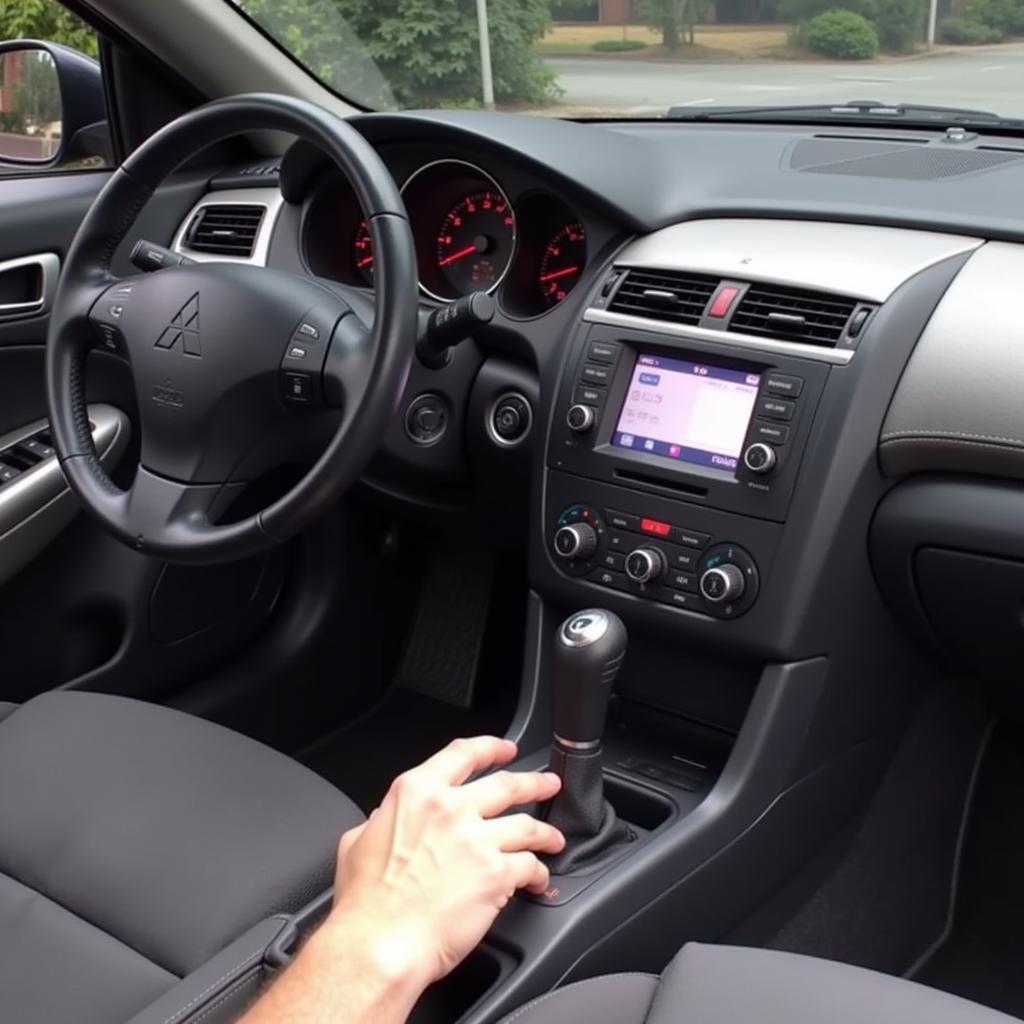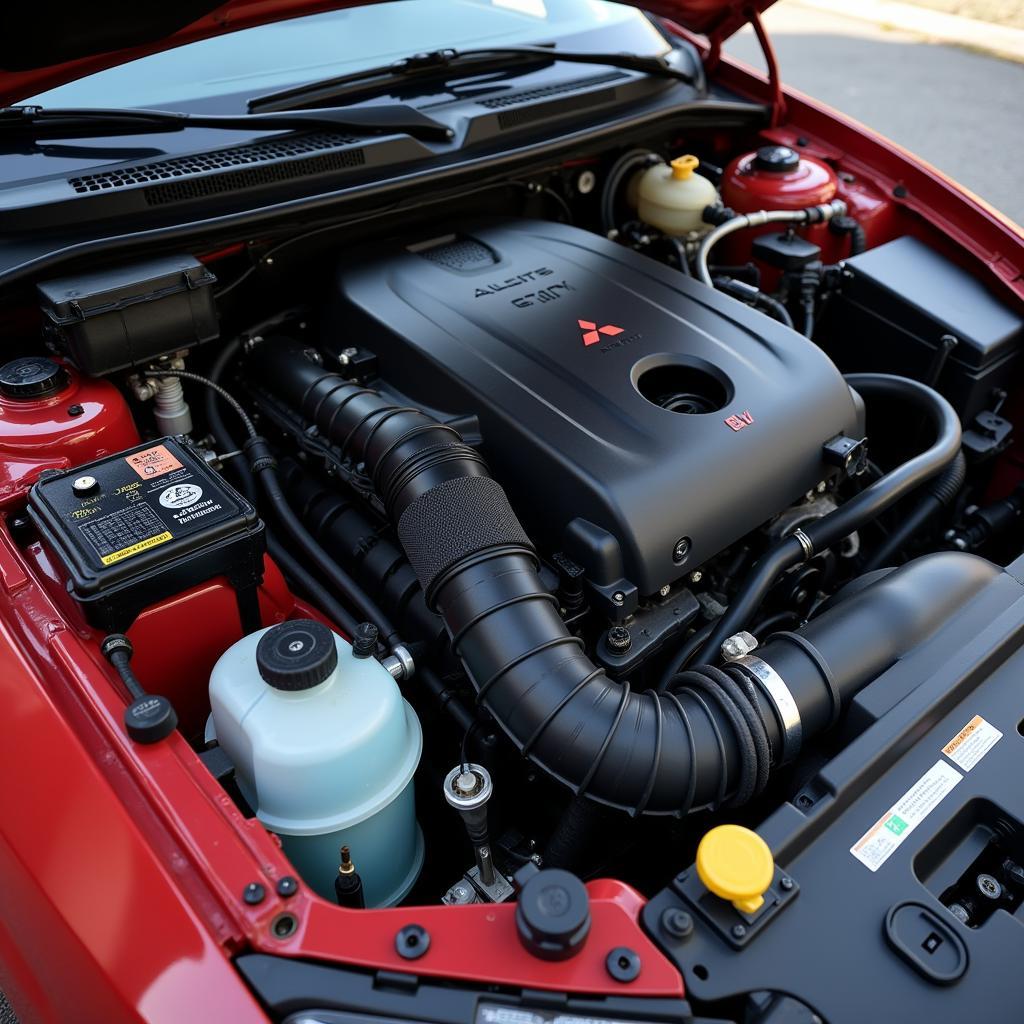Eclipse Car Diagnostics refers to the process of identifying and troubleshooting issues within the electronic systems of Mitsubishi vehicles, particularly those manufactured under the Eclipse model. Utilizing specialized tools and software, mechanics can access and interpret the data stored within the car’s computer system, pinpointing the root cause of various problems. These can range from simple issues like a malfunctioning sensor to more complex concerns involving the engine or transmission.
What makes Eclipse Car Diagnostics Unique?
Mitsubishi Eclipse vehicles, known for their sporty design and performance, come equipped with sophisticated onboard computer systems. These systems continuously monitor various components and functions, flagging any irregularities through Diagnostic Trouble Codes (DTCs). Eclipse car diagnostics delve into these DTCs, providing invaluable insight into the car’s health and performance.
 Eclipse OBD2 Port
Eclipse OBD2 Port
The Importance of Regular Eclipse Car Diagnostics
Just like regular checkups with your doctor, routine car diagnostics are vital for maintaining the health of your Mitsubishi Eclipse.
Here’s why:
- Early Problem Detection: Diagnostics can identify potential issues before they escalate into major, costly repairs.
- Improved Performance: By addressing minor issues promptly, you can ensure optimal engine performance, fuel efficiency, and a smoother overall driving experience.
- Increased Safety: Faulty components can compromise your safety on the road. Regular diagnostics can pinpoint and address these concerns, ensuring your vehicle remains safe to drive.
- Higher Resale Value: A well-maintained vehicle with a documented service history, including regular diagnostic checks, holds a higher resale value.
Common Issues Diagnosed in Mitsubishi Eclipse
While the Eclipse is generally a reliable vehicle, certain problems tend to arise more frequently. Some of these common issues include:
- Oxygen Sensor Malfunctions: A faulty oxygen sensor can disrupt the air-fuel mixture, leading to decreased fuel efficiency and increased emissions.
- Catalytic Converter Problems: Issues with the catalytic converter can trigger warning lights and affect the vehicle’s emissions control system.
- EVAP System Leaks: Evaporation emission control (EVAP) system leaks are common and can lead to fuel odor and engine performance problems.
- Transmission Issues: Some Eclipse models have been known to experience transmission issues, often indicated by rough shifting or slipping gears.
- Electrical System Faults: Problems with the electrical system, such as faulty wiring or a failing alternator, can cause a range of issues, from dim headlights to engine starting problems.
Understanding Diagnostic Trouble Codes (DTCs)
Diagnostic Trouble Codes (DTCs) are alphanumeric codes that correspond to specific issues detected within your Eclipse’s systems. These codes act like clues, guiding mechanics toward the root of the problem. Using a diagnostic scanner, mechanics can retrieve these codes and interpret their meaning, using this information to guide their repair strategy.
DIY vs. Professional Eclipse Car Diagnostics: Which is Right for You?
While basic OBD2 scanners are readily available for car owners, professional-grade equipment offers a more in-depth analysis and interpretation of the vehicle’s data. This is especially important for complex issues or for car owners who may not be familiar with interpreting technical data.
“For peace of mind and accurate diagnosis, it’s always best to consult with a qualified mechanic specializing in Mitsubishi vehicles,” says John Miller, a seasoned automotive technician with over 20 years of experience. “While DIY scanners can provide some basic information, they often lack the depth and accuracy of professional-grade tools.”
Beyond the Codes: The Importance of Experience in Eclipse Diagnostics
While diagnostic tools play a crucial role in identifying issues, experience and expertise are equally important in accurately interpreting the data and formulating an effective repair plan. A seasoned mechanic understands the nuances of Mitsubishi Eclipse systems and can often diagnose problems that might be missed by relying solely on codes.
 Mitsubishi Eclipse Engine Bay
Mitsubishi Eclipse Engine Bay
Conclusion
Eclipse car diagnostics are an essential aspect of maintaining the performance, safety, and longevity of your Mitsubishi vehicle. By addressing issues promptly and proactively, you can enjoy a smoother, more reliable driving experience while extending the lifespan of your Eclipse.
Remember, regular maintenance and timely diagnostics are the keys to enjoying your Mitsubishi Eclipse to the fullest.
FAQ
1. How often should I get my Eclipse diagnosed?
It’s recommended to have your Eclipse diagnosed at least once a year or every 12,000 miles, whichever comes first.
2. Can I diagnose my Eclipse myself?
While basic OBD2 scanners are available, it’s best to consult a qualified mechanic for accurate and comprehensive diagnostics.
3. What is the OBD2 port?
The OBD2 port is a standardized connector found in most modern vehicles, allowing diagnostic tools to communicate with the car’s computer system.
4. What do I do if my check engine light comes on?
If your check engine light illuminates, it’s essential to have your Eclipse diagnosed as soon as possible to identify and address the underlying issue.
5. How much do Eclipse car diagnostics cost?
The cost of diagnostics can vary depending on the complexity of the issue and the mechanic’s labor rates.

Leave a Reply